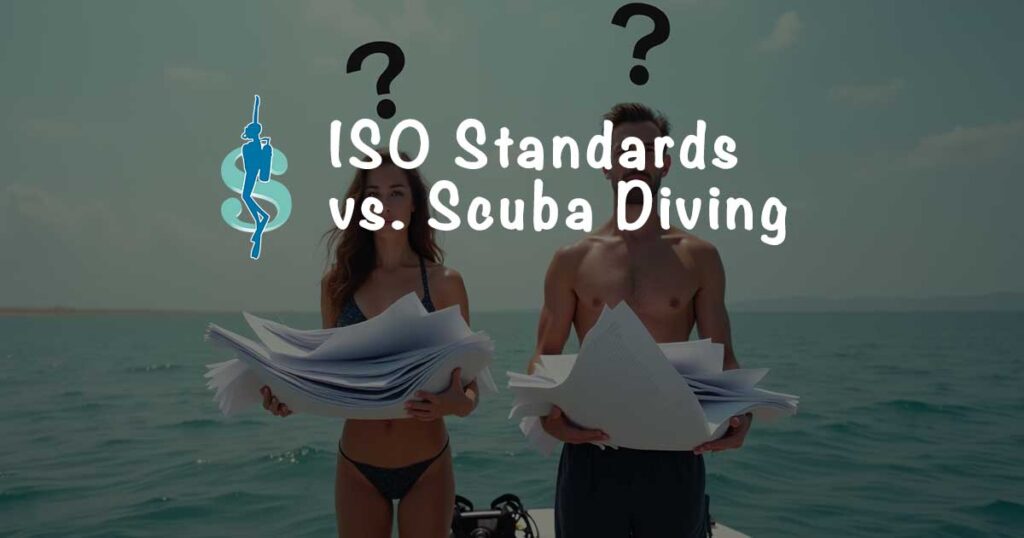What are the ISO standards relevant to scuba diving professionals, not just the scuba-related ones?
Handy Reference List of ISO Standards for Scuba Diving Courses & Dive Business Operations
We will list ISO standards directly related to scuba diving and more general ones that should still help us manage our dive businesses and provide a quality scuba diving experience.
What is good and bad about ISO Standards in the dive industry?
“ISO standards are developed by groups of experts from all over the world, that are part of larger groups called technical committees. These experts negotiate all aspects of the standard, including its scope, key definitions and content.” Source: ISO.
I’ve worked in other industries where such a process made sense. I’m not so sure about the way we do it in the dive industry.
The committees preparing ISO standards directly related to levels of diver training are usually comprised of representatives from dive training agencies. Therefore, what we see in those ISO standards tends to reflect how dive training agencies perceive the world, for their own benefit.
Unfortunately, we cannot count on scuba-related ISO standards to raise the bar on quality or allow for different ways of providing a quality scuba diving experience beyond peddling c-cards with a pyramidal series of diver training levels.
As a case in point, I suggest you read “Rebreather Training: Are We Certifying Ourselves into Extinction?” on InDEPTH Magazine. Although Jeffrey Bozanic addresses the ISO standards related to rebreather diver training, the same underlying issues are evident in the way dive training agency representatives prepare ISO standards related to scuba diving training, ensuring that dive training agencies remain at the top of the food chain while dive professionals work below minimum wages in dive centers cutting corners.
However, our purpose here is simply to provide you with a list of ISO standards that are relevant to you as a dive professional, whether you are teaching scuba diving courses or managing a dive business.
This post is part of our Shifting Tides: Dive Industry Assessment & Strategies for Today’s Scuba Divers series by the Business of Diving Institute and Darcy Kieran, author of:
Contents on This Page
Scuba-Related ISO Standards
Scuba Diving Operations
- ISO 24803: Recreational diving services — Requirements for recreational diving providers (nature and quality of the services to the client; excluding freediving)
- 24803 Case Study: Egypt
- ISO 21416: Recreational diving services — Requirements and guidance on environmentally sustainable practices in recreational diving (including snorkeling, scuba, freediving)
- ISO 13289: Recreational diving services — Requirements for the conduct of snorkelling excursions
- ISO 11121: Recreational diving services — Requirements for introductory programmes to scuba diving
- ISO/PAS 20708: Recreational diving services — Requirements for artificial open water sites
- ISO 11625: Gas cylinders — Safe handling
- ISO 12209: Gas cylinders — Outlet connections for gas cylinder valves for compressed breathable air
Core Dive Training Levels
- ISO 24801-1: Recreational diving services — Requirements for the training of recreational scuba divers; Part 1: Level 1 — Supervised diver (e.g., PADI Scuba Diver)
- ISO 24801-2: Recreational diving services — Requirements for the training of recreational scuba divers; Part 2: Level 2 — Autonomous diver (e.g., PADI Open Water Diver)
- ISO 24801-3: Recreational diving services — Requirements for the training of recreational scuba divers; Part 3: Level 3 — Dive leader (e.g., PADI Divemaster)
- ISO 24802-1: Recreational diving services — Requirements for the training of scuba instructors; Part 1: Level 1 (e.g., PADI Assistant-Instructor)
- ISO 24802-2: Recreational diving services — Requirements for the training of scuba instructors; Part 2: Level 2 (e.g., PADI Open Water Scuba Instructor)
Rebreather Diver Training
- ISO 24804: Recreational diving services — Requirements for rebreather diver training — No-decompression diving
- ISO 24805: Recreational diving services — Requirements for rebreather diver training — Decompression diving to 45 m
- ISO 24806: Recreational diving services — Requirements for rebreather diver training — Decompression diving to 60 m
- ISO 24807: Recreational diving services — Requirements for rebreather diver training — Decompression diving to 100 m
- ISO 24808: Recreational diving services — Requirements for rebreather instructor training
Scientific Divers
- ISO 8804-1: Requirements for the training of scientific divers; Part 1: Scientific divers
- ISO 8804-2: Requirements for the training of scientific divers; Part 2: Advanced scientific divers
- ISO 8804-3: Requirements for the training of scientific divers; Part 3: Scientific diving project leader
- ISO/CD 25325: Requirements for the training of Citizen Science Divers (Under development)
Other Dive Training Programs
- ISO 13970: Recreational diving services — Requirements for the training of recreational snorkelling guides
- ISO 11107: Recreational diving services — Requirements for training programmes on enriched air nitrox (EAN) diving (e.g., PADI Nitrox Diver)
- ISO 13293: Recreational diving services — Requirements for gas blender training programmes
- ISO 21417: Recreational diving services — Requirements for training on environmental awareness for recreational divers
Non-Scuba-Related ISO Standards Pertinent to Dive Professionals
Quality: Operations & Customer Experience
- ISO 9000: Quality management systems — Fundamentals and vocabulary
- ISO 9001: Quality management systems — Requirements
- ISO 9001 for Small Enterprises: What to do?
- ISO 9001: SME success package
Sustainable Tourism & Environment
- ISO 20611: Adventure tourism — Good practices for sustainability — Requirements and recommendations
- ISO 21401: Tourism and related services — Sustainability management system for accommodation establishments — Requirements
- ISO 14001: Environmental management systems — Requirements with guidance for use (to ensure we are taking proactive measures to minimize our environmental footprint)
- ISO 14001: SME success package
- ISO 14002-1: Environmental management systems — Guidelines for using ISO 14001 to address environmental aspects and conditions within an environmental topic area; Part 1: General
- ISO 14002-2: Environmental management systems — Guidelines for using ISO 14001 to address environmental aspects and conditions within an environmental topic area; Part 2: Water
- ISO 14005: Environmental management systems — Guidelines for a flexible approach to phased implementation
- ISO 14006: Environmental management systems — Guidelines for incorporating ecodesign
You may also be interested in the following podcast episode, which discusses ISO standards in relation to scuba diving:
Continue reading about Shifting Tides: Scuba Diving Industry Assessment & Strategies for Today’s Scuba Divers.
If you found the information on this page valuable, would you consider buying me a coffee?
Either way, let’s work together on “raising the bar” in the dive industry to satisfy today’s consumers!
Your Dive Industry Compass
Scuba Diving Market Research, Surveys, Reports & Statistics
Shifting Tides
Strategies for Today’s Scuba Divers
Living The Scuba Dream
Plan Your Scuba Instructor Career & Deep Dive the Plan
You may also be interested in The Immersion Zone (our podcast), Scubanomics (our newsletter for dive professionals), and our published books & reference guides.





